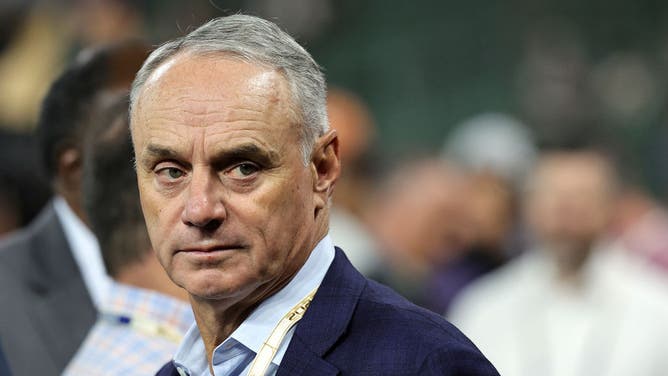Rob Manfred Addresses Criticism Of MLB’s New Postseason Format
Major League Baseball commissioner Rob Manfred has heard the criticisms of the league’s postseason format this season. And Thursday afternoon, he addressed some of them, while explaining what the league intends to do about it in the near future.
Manfred spoke to reporters before Game 4 of the Philadelphia Phillies-Atlanta Braves NLDS, which resulted in yet another upset series win. According to ESPN’s Jesse Rogers, he was asked about the lengthy layoff between the end of the regular season and start of the division series for teams that secure a bye.
And in general, he wants everyone to remain patient.
"It's only Year 2," Manfred said "I'm sort of the view you need to give something a chance to work out. I know some of the higher-seeded teams didn't win. I think if you think about where some of those teams were, there are other explanations than a five-day layoff. But I think we'll reevaluate in the offseason like we always do and think about if we have the format right."
For many outside observers, it’s already pretty clear that the league doesn’t have the format right.

HOUSTON, TEXAS - OCTOBER 29: Commissioner Robert D. Manfred Jr. on the field prior to Game Two of the 2022 World Series between the Houston Astros and the Philadelphia Phillies at Minute Maid Park on October 29, 2022 in Houston, Texas. (Photo by Bob Levey/Getty Images)
Rob Manfred Defends MLB’s Chase For More Money
Several managers and players have spoken out about the format, declining to call the five day break an excuse, while admitting it’s far from ideal.
"I don't think we need five (days off), but we did need a few," said Baltimore Orioles manager Brandon Hyde. "Whether that affected us this series or not, I'm not going to speculate. But it's a long time off. That's the bottom line."
But the problems with the league’s changes go far beyond the extended break, which potentially hurts teams by removing them from competitive situations for nearly a week. Last season, teams that secured a bye went just 8-8 in the playoffs; non-Astros teams were 5-8.
This year’s significantly worse.
With the Braves loss on Thursday, the Dodgers, Braves and Orioles went a combined 1-9 in the division series. Including the Astros, the other team that secured a bye, improves the combined record to just 4-10. That’s a problem. No matter if Rob Manfred’s willing to admit it or not.
READ: MLB HAS A POSTSEASON PROBLEM, AND HERE ARE SOME IDEAS OF HOW TO FIX IT
There should be a reward for teams that have regular season success; it’s a lot harder to be good over 162 games than it is to win a small sample size series. But outside of the Astros, who’ve inexplicably found the secret to the layoff formula, having a first round bye seems to be something of a disadvantage to advancing to the NLCS or ALCS.
What Should MLB Change Going Forward?
This year there isn’t a single team to win more than 90 games in either league championship series. That doesn’t mean the Diamondbacks, Phillies or Rangers aren’t deserving teams, they did win the first rounds of the tournament after all, but it does indicate that the rewards for putting together consistent, dominant regular seasons are now virtually nonexistent.
Manfred continued, saying that he thinks there needs to be “a little time” given to the format before making substantial changes.
"It's one of those things where we would have a conversation about it if we wanted to do something," he said. "But I think the most important point is the first one: It's Year 2. I think we need to give it a little time...We all want the competition to be the best it can possibly be."
These changes though, are all about the league increasing revenue through additional playoff teams. Adding more postseason games is beneficial for television partners, stadium revenues and merchandise sales. But not for competition.
The league could eliminate travel days between the end of the wild card series and division series, punishing the non-bye teams with less rest and removing their ability to reset starting rotations. They could expand the division series to seven games, while giving the bye teams three consecutive home games to start the series.
Or more radically, give those teams an advantage to start the series, making it harder for wild card teams to win. Not because the playoffs must only result in 100 win teams winning, but because the regular season should matter.
Many fans seem to think it shouldn’t though, enjoying the upsets, chaos, randomness and inherent parity between teams. Maybe they’ll start to care when a team that finishes under .500 wins the tournament. Or maybe not.
Rob Manfred doesn’t seem to.